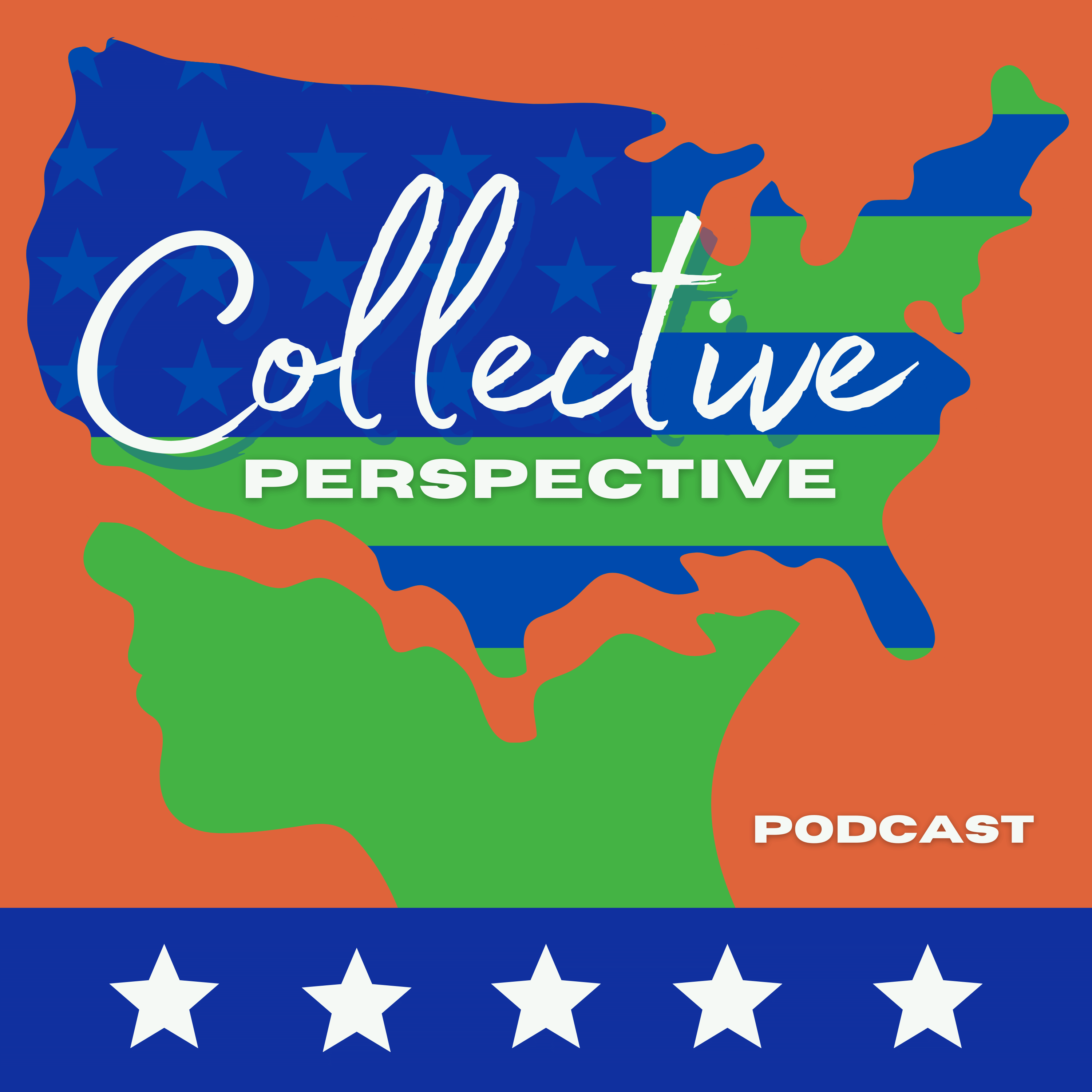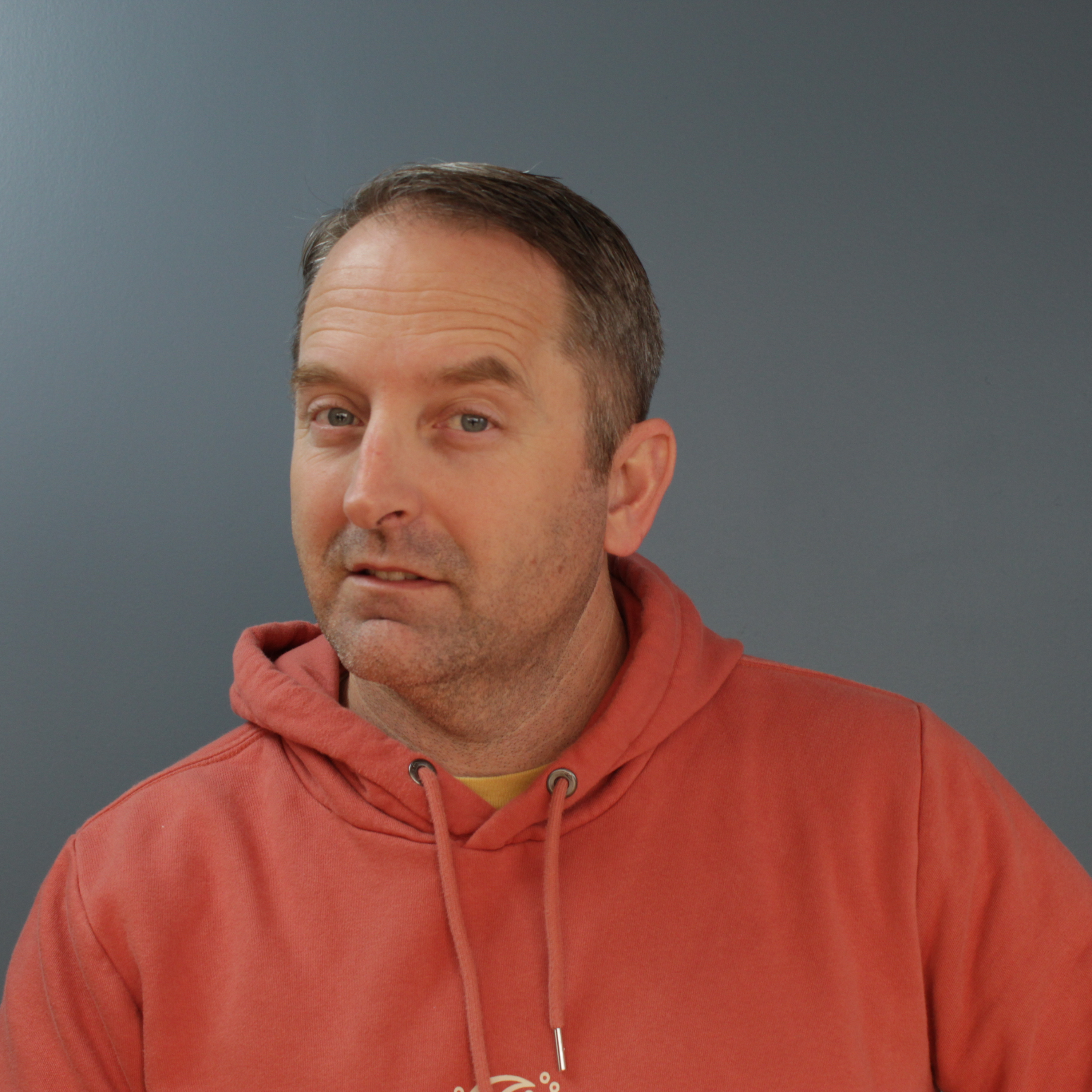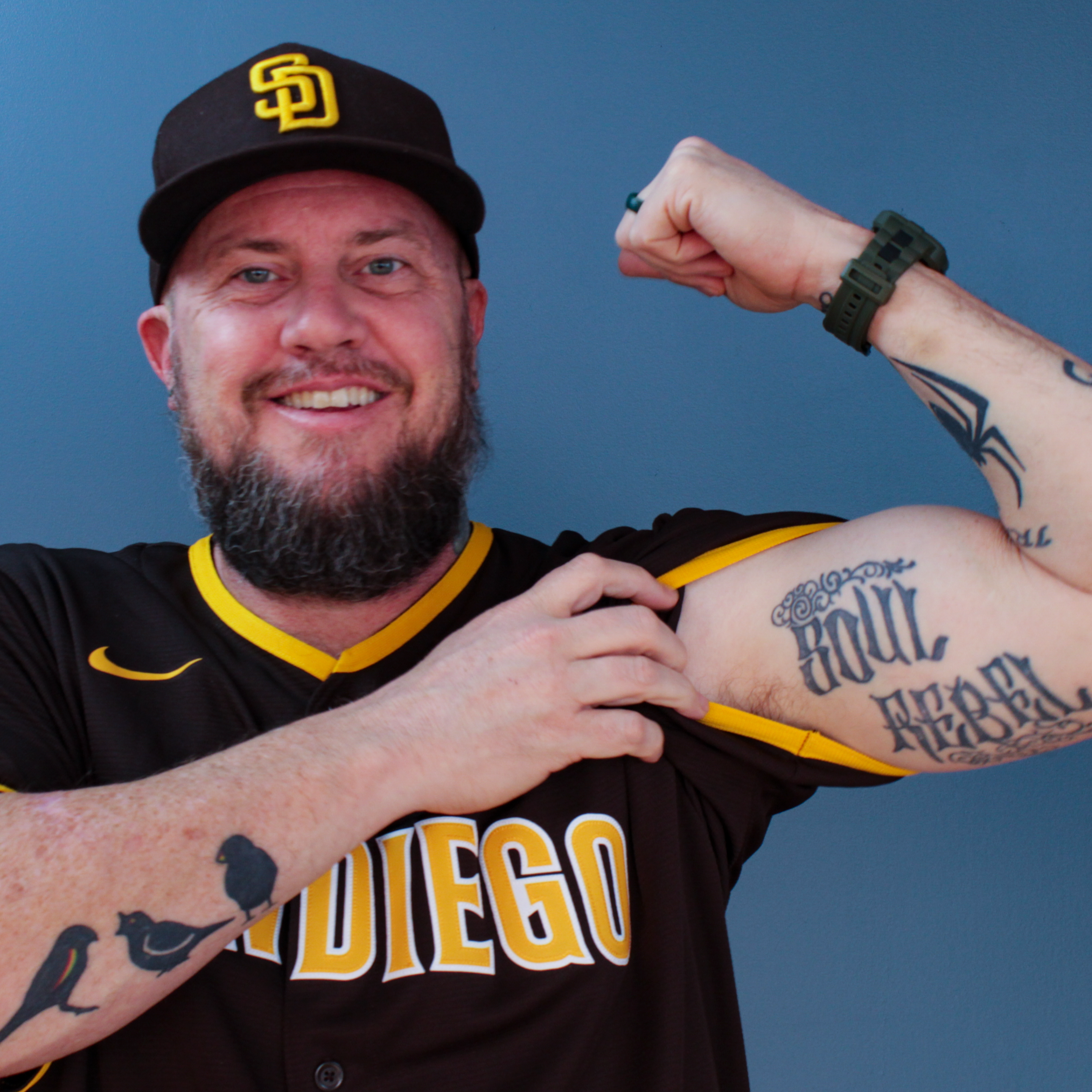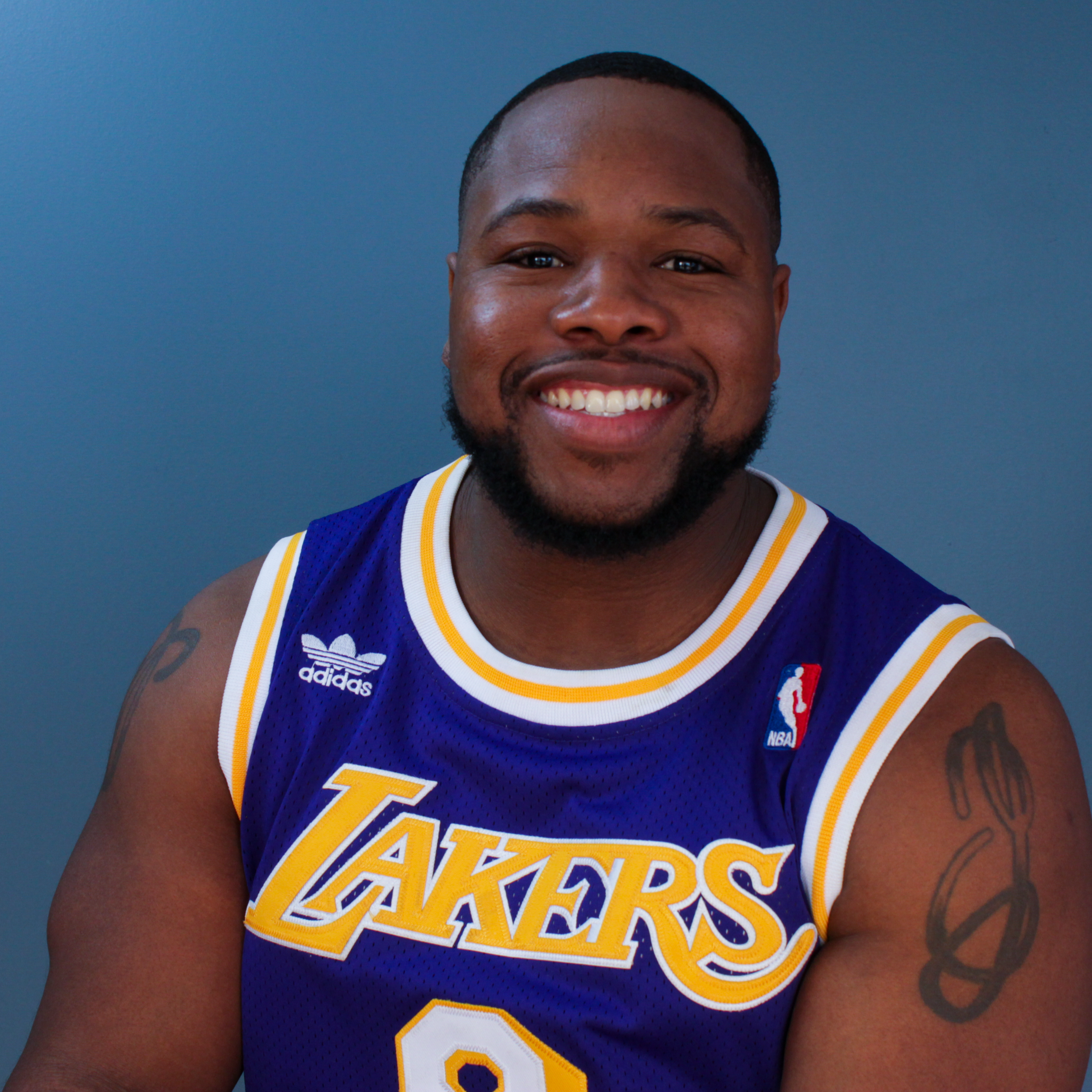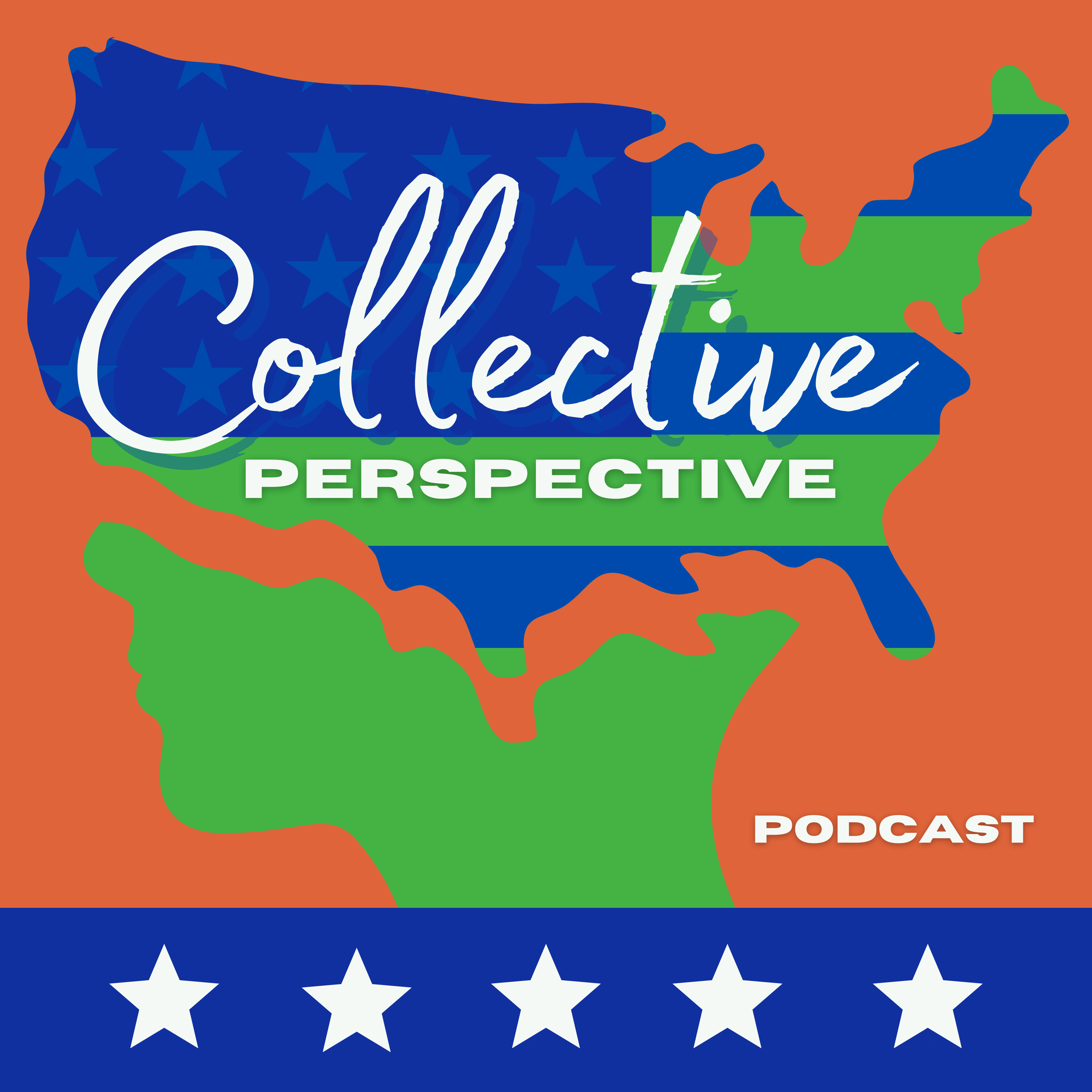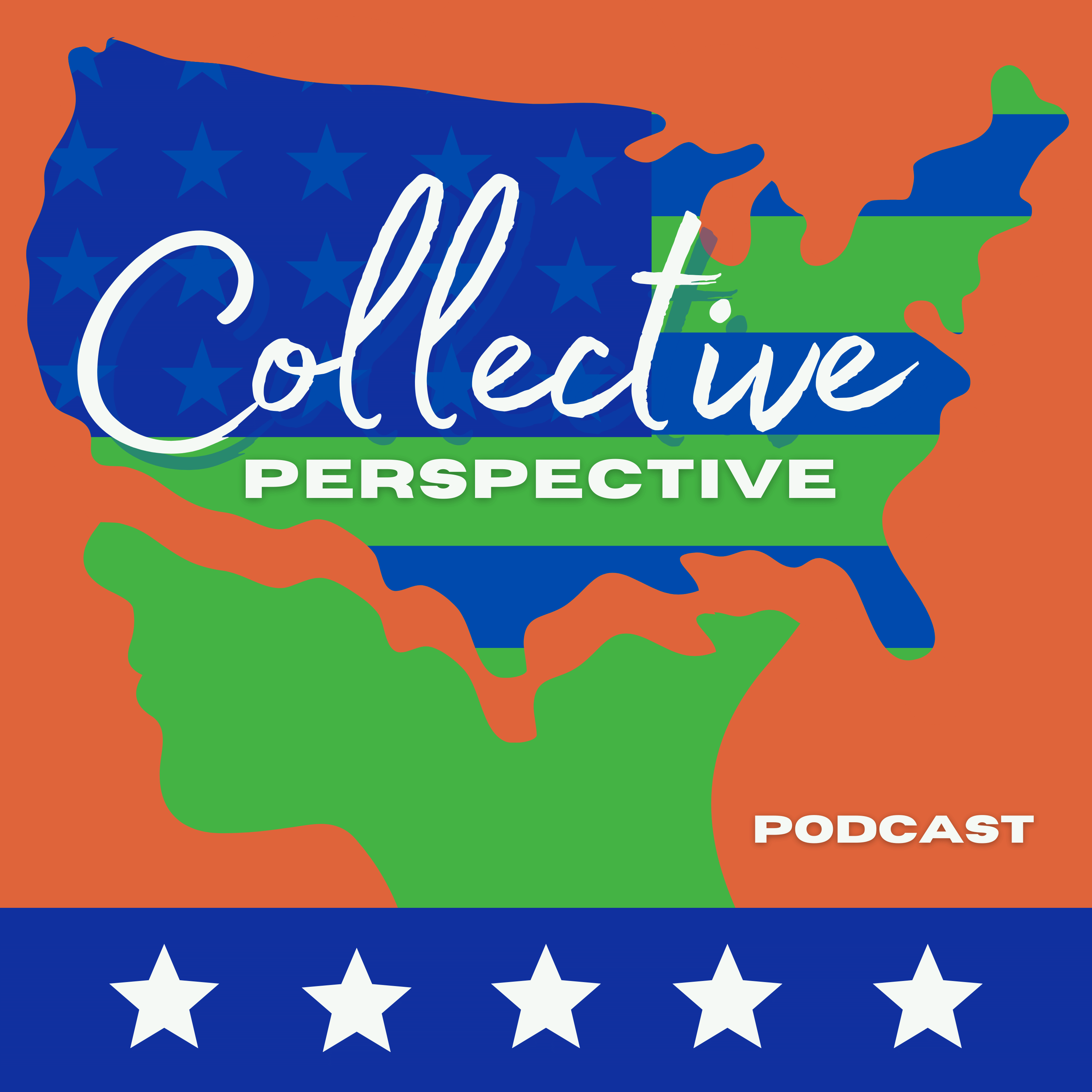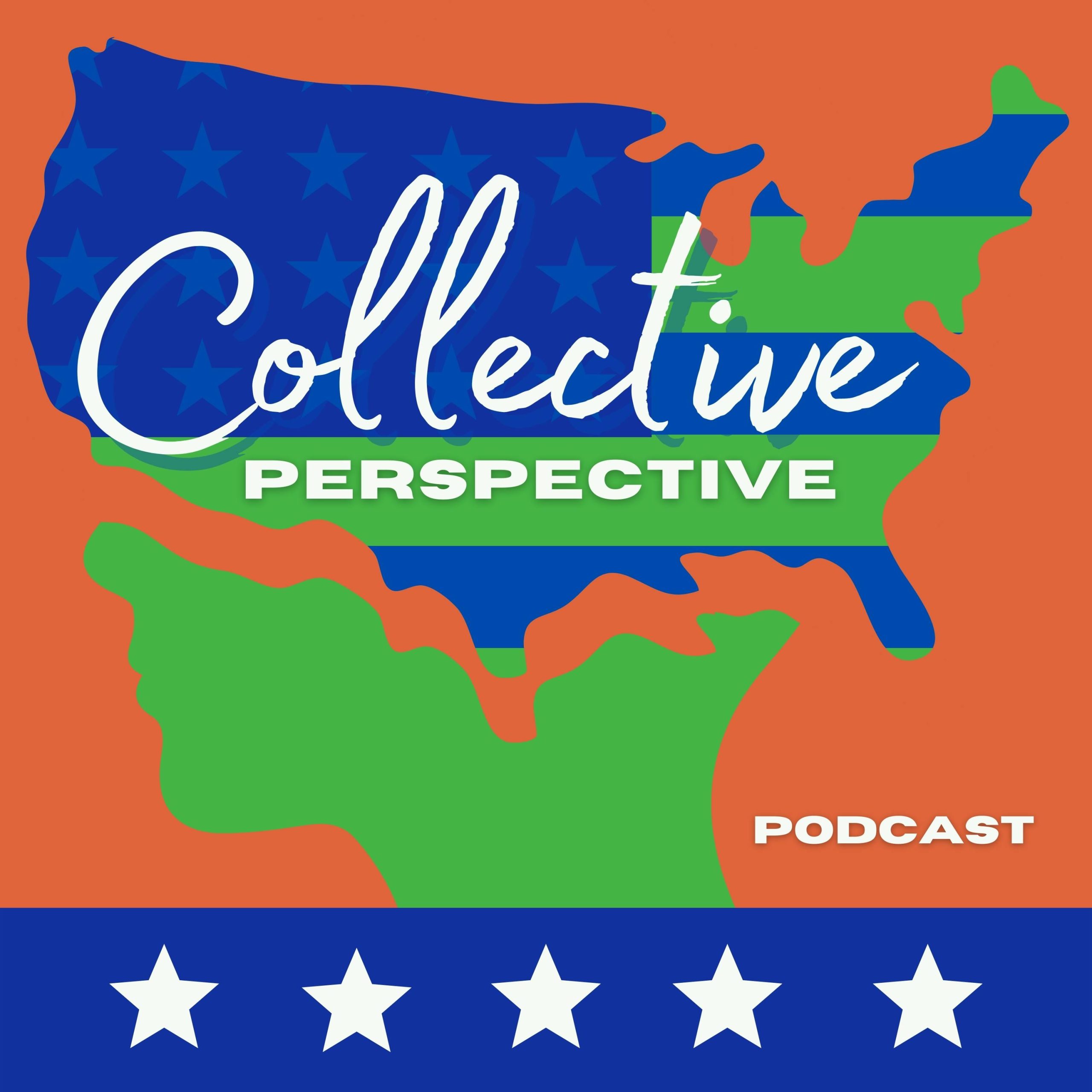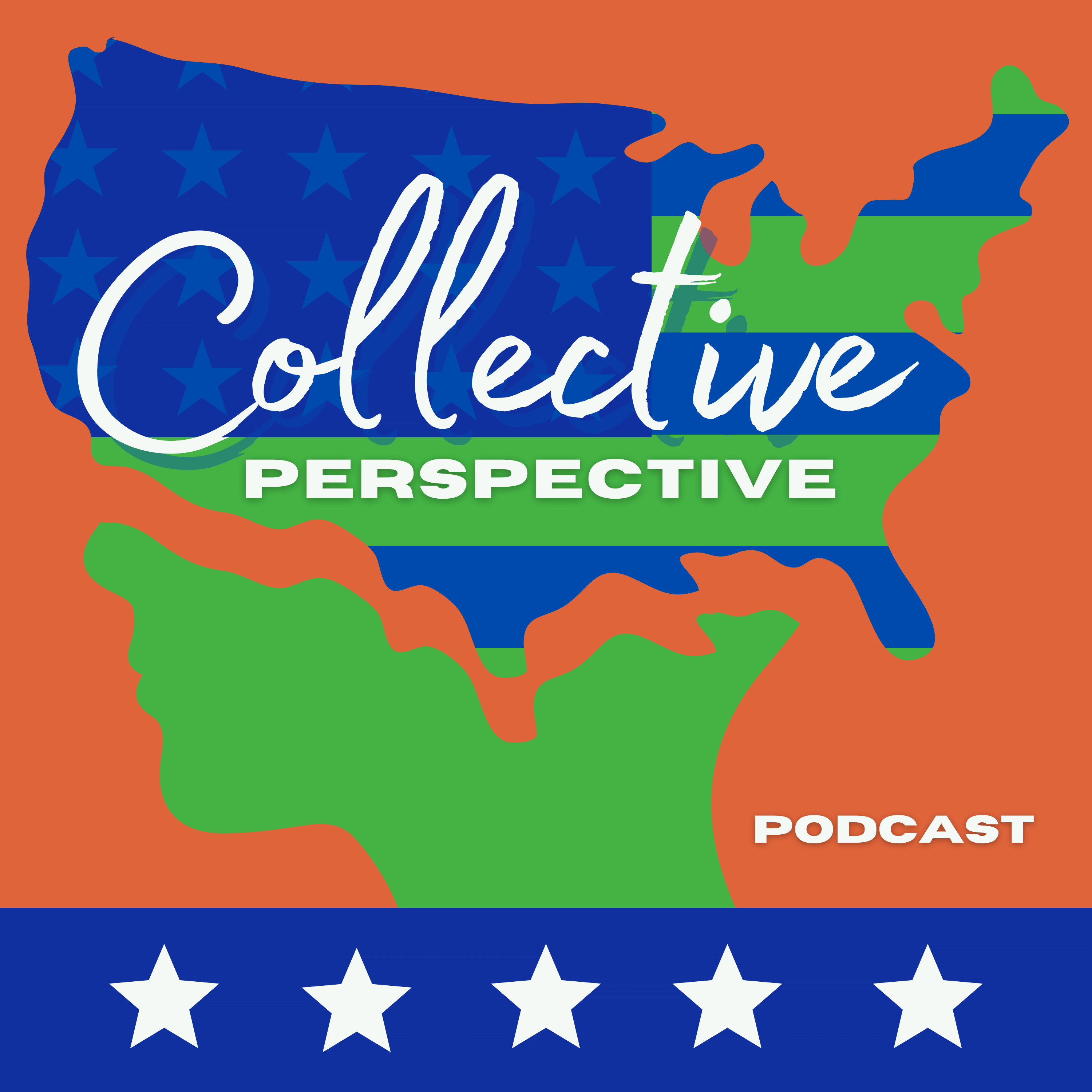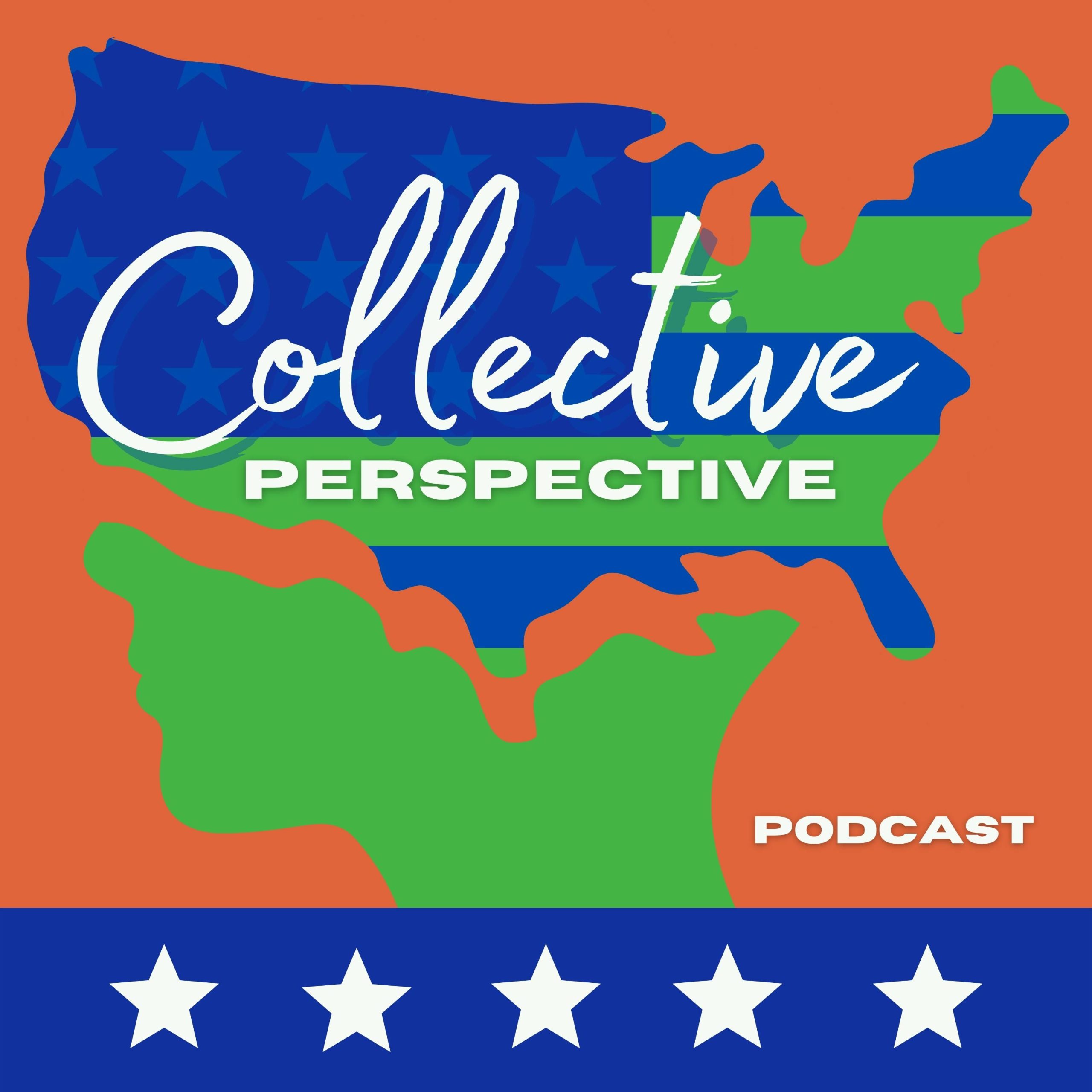Episode Transcript
This isn't just a podcast, it's a reminder. A reminder of what makes America Stronger isn't a headline or a hashtag. It's people from the ones building our homes to the ones rebuilding their lives, veterans, tradesmen, neighbors and volunteers, real people doing real things. Here we find common ground first, and then we work on our differences.
This is the collective perspective podcast where purpose, people, and progress mean.
Here we're with Logan going to Wright's Welding. Let's see what's inside here. House on the river. They, we showed the customer and showed us what they wanted. They had an idea, and we usually do straight picket, right? So we gave them the catalog. Say, Hey, choose. You don't have to choose that. So we let, we showed 'em where they can go look at the catalog online, and they chose these right here.
And this is, uh, they wanted a big rail for here. So we talked about the size
PP proper.
Jacket.
Oh yeah, that's that leather. Yeah. That's gonna keep that, that flyer off for burn. Some people are hardheaded like myself. I got burns all over. Right. So you use your PPE, it's just a raise from it. The actual raise, yeah.
What you think, Logan? Pretty cool. Yeah. There you are. You get a ground clamp, just like a battery battery for a car. You ground a negative and a positive. Gotcha. Usually 95% of the time always on the work piece. So I said that to the work piece and that ground, what that does that grounds all the metal around it.
This is not touching this No problem. Even if it was, it wouldn't bother at all. So what we're gonna do, I'm gonna this up, you.
Okay. Your right hand left handed. Um, mostly lefthanded. Okay. That's good note because you wanna kind of get your preference.
Yeah. Angle we can't see anything. Oh, okay. And I'm just tacking it up. Okay. He's looking back.
Got your hood down. Yep. Get closer. I can go over here. No, you good? I closer right there. I'm okay.
All I did was tack it. So won't. Okay, so now here. There you go.
Come over here. Yeah, that's right, Jeff.
Sweet. Sweet. Yeah. Look, look down. You can see it though. You can see it, right? Yeah. A little bit. Right? Right here? Yep. So I'm just hold your hand. What I want you to just do, hold your hand. Alright. Right. So what you do is you,
so what, what we're gonna look at, we're gonna look at a, it's gonna make a puddle. Okay? And then once we get that right puddle, we're gonna just continue to travel with that. The size of that puddle is gonna dictate your speed. Okay? Put the big puddle together. You going look. Move a little bit faster if it's too big.
So we'll find out what's just right and then you go from there. So just gonna hold it. You don't me. Okay, ready. Don't worry about that.
That's it. Alright. That's it. That's what we doing. Top and the bottom. That's what you want. See, that's why you see this one's kind of on top favor. So I kind of blind, but that's what we be doing. So in that, in this, in this regard, we be doing it in a 45 angle of this and traveling. Alright, so anytime you would clean up, if you want to present this, you would always clean up all this dvs and things like that.
So what we're gonna do is I want get you, I want you to run a couple of them. It's not gonna be beautiful okay? But we're gonna work at it. Okay? We gonna run a couple of them. You gonna run ready? Yep. So that angle, your, your rod angle meaning this or this would change it. So always try to get a 45. Relax, shoulders always gotta be relaxed.
You good to go?
Go ahead, get back right here. Look at me. See, see it back. There you go. Closer. Closer on the other one. There you go. Yeah. Right there.
There you
good? Good.
So you did, no, you did good. So you go to examine it, you'll see right here where you started. You got really good right here. You got really good right here. Okay. And you, you maintain that through. That got a little fast. When you go fast, it starts to look like a little arrow. Yeah. 'cause it's trying to change.
It gets uhhuh. It's trying to chase. You're moving too fast too. Let it be oval and full. You want your, well put full like that. That's perfect. Right? Perfect size right there. Get right here. A, that's a little big. So you see, you slow down, Uhhuh. Don't worry about the getting off of that. You'll get that later.
So this is, that's a perfect unified well, right there, right here. Right here. This is perfectly unified because you don't see any indentions to where trash could get in, like possibly right here, top, yeah, yeah, yeah. Correct. Yep. Your world right there. Nice and slow, but don't stop nice and slow, but don't stop.
Gotcha. Alright, go ahead. Ready?
Good. Good, good, good,
good, good. Pop off. Good. Still Logan, that line Uhhuh to that top line that my friend, that right there. I hired you for that. You do that consistently. That that engine and a half right there. That's what we're looking for. Kind of. I kind of went off a little bit right there. There you go. I got back in.
That's right. Left it and we got back in. That's right. Good. My son, he's still trying to find his way, and I told him I didn't know what I wanted to do. Even in high school, I, I had second thoughts about going to the military. Yeah. And that was when we decided to, you know, when I went to the military, I was like, all right, this is, this is my job.
This is what I do. And most, most of us at that age, if we don't have, even if we have that guidance sometimes from our parents or whoever it may be, it's still hard to. As a young boy, teenager, figure out, like, you have, you know, your direction. He wants to go play with his friends and go fishing, you know, your direction.
What do you wanna do? No, I, I mean, I like what I was doing here, or I, or you know, you just get engulfed in something. It's hard to say, okay, I'm gonna leave the nest and go somewhere. But, you know, that's what, uh, I mean, some of 'em, we have, we have college kids and, and, uh. They're, they're really the college kids.
They're either forced, forced into that idea, or they're like, like your daughter, they, they already have that higher education already on their mind. Mm-hmm. And they already go for it. They're already taking classes in high school, preparing. Those are the ones that gotta go 'cause they're already ready.
Welcome to the Collective Perspective podcast. We're just trying a new type of intro here. You've been hearing some brilliant words from our friend Richard Wright of Wright's Welding and Fabrication, and, uh, my buddy Travis is here. Welcome back everybody. This episode we want to talk more about what makes America stronger, and it's gentleman like Richard that makes this country stronger.
Uh, maybe it's something they didn't think about on a daily basis, but the amount of work that goes into what you do, mm-hmm. Running a business and, uh, all of the obstacles that comes with that. Yeah. The stress, having a great family, being a man of God. Yeah. You have a lot on your plate, sir. And yet you still mentor young men.
Yeah. And, and it's pretty amazing. So, yeah. Uh, thank you. Uh, could you tell us more about like, what got you into welding? What, what was like a sign? When you got outta high school or were you already in high school or what? Right. Like what did you say? Like, man, this is what I want to do. Right. So I took the, the long route, I took the 40, I took the 40 year route.
Yeah. I took the Israel route. So I was in, uh, welding was not on my radar in school. I was, school was prob problematic for me. I didn't have a great home structure. Grandma did the best she could. Wonderful woman. And, um. You know, I grab As, as young men, we, we gravitate, we are looking for identity and we just search it out and we find it.
It's somewhere, somewhere, uh, somewhere, some fashion form or fashion. And, and I found the streets and uh, that's who I knew. It was close right outside. And that's what we did. That's what I did for a long time. Went back and forth to jail. Uh, not serious crimes, but just. I just involved in these things. And, um, and then welding, I actually, I actually went and did two years in a probationary camp.
It's the longest time I ever did. And, uh, when I got out, uh, I found a job at the local, uh, lumber yard. And it was an issue where they wanted me to stay somewhere that in another county that didn't live, they made me, they said, you're gonna find, get an address over here. Oh, you're gonna, you're gonna go back to jail.
I'm like, what? What are you, what are you? It's insane. So, um, I did end up finding some place to stay with a, with a friend, uh, actually a relative, and there was a job open. The job was, let's say JEA that's here. They would go in and it's called a sh a outage, a shut down, or they'll shut down a certain part just to refurbish it.
And that was kind of, everybody in our town kind of worked, things like that. So you got some places where they work, seasonal potatoes or whatever it is in that area. This is what it was. It was a shutdown, an outage that you go into the, the mill or the, or the, um, electrical power, uh, plant and you would work labor non-skilled.
Some of the older guys had skills, but they didn't share any knowledge. So it was just from the, from the neck down basically. And, uh, so when I went in, the first day I got in, I seen a childhood friend that was there in Brunswick. I'm from Folkston, Georgia. Uh, so right next door. Right. And, uh, he was, he was, he was le as I was coming in hiring, he was leaving out saying, Hey, uh, I'm about to go to welding school.
Yeah, I mean, welding was a part of the outages, but we didn't have anything to do with it. It was just laborers. So I said, okay. So, um, about two weeks of working that job, um, I ran into, so in that field you got multiple crafts. So two crafts that usually work together are, is, uh, pipe fitters and then a pipe welder.
Mm-hmm. And then usually they have a helper. I was the helper. Um, so, uh. Joking, c camaraderie built out there. A lot of, a lot of jokes, probably like the military, uh, wherever you find community at. And they said, I, I, Hey man, I, I bet you can't. Uh, I asked him what it was, what they were doing. Mm. And it was a piece of pipe.
And, uh, he said, ah, I bet you can't put, put a root in it, which is just joining two pieces of pipe together and then welding it. I was just eager. I said, uh, yeah, I'll, I'll bet you $50. Of course, I didn't know anything about the settings. I didn't, I never even looked at it and I blew the pipe up. It was just a mess.
They probably tricked me. I paid this $5 and then, uh, it's $50. And then my friend called the next day and said, Hey man, I'm in school, man. What's up? He said, you can be in school next week. So they would every three a three week interval, they would just bring new people in. And I was like, okay, I'm gonna go.
I didn't have anything. I said, I'm gonna go. And, uh, and that's what I did. I quit that job, came over here to Jacksonville and, uh, started with Tulsa welding, and I was still kind of in the streets a little bit, but there was, it was a pa it wasn't a passion. I didn't love it, didn't have any kinda ideas about the welding, but I did it.
And then, um, I ended up quitting the welding school halfway through. To go work. It was a legal situation and I pretty much was on the run. That's what happened. And I said, I gotta get outta town, you know, and I went out, I went to Ohio, my first welding test. I wasn't finished with school, my first welding test, and um, I passed the test.
And that started it right there. It wasn't, I, I didn't, I worked that job. They didn't really let the rookies get on, so I didn't really get to Weld. Still was running around doing my thing. They did let us out, get a little piece here at the end. Um, but they let the veterans, 'cause it's a critical project, projects weld's very serious.
So they know you're new. They're not gonna, they're gonna try to, if they're, if they're wise, they're gonna put you in good positions of something that's not gonna. So, um, that was oh oh 5, 0 4 0 5. I didn't get pick it back up until oh 7 0 7 came, and it was, it was legal issues again, and I was like, I just, I was, but I was maturing at that time and I was like, ah, I just got, I'm just sick of this lifestyle up and down, the ebbs and flow of it all.
I need to, I need to, I need to, I need to out. I thought about it. I got that welding, and for the first time I used it, it was a tool, and I, I left and I went to Kentucky, which you see my, my phone number is a five oh two. Yes. From that time, 2000, 2007, 2008, and I ended up meeting my wife in Kentucky.
Kentucky, okay. Yep. She's from Kentucky. And, uh, it just, is there any type of Kentucky joke about being from Kentucky? It probably is, but no, it's probably not funny. Yeah, I don't, yeah, I don't, yeah. Yeah, there's probably none. None that I've heard. I'm sure it's out there. Right. But, um, the, uh, what happened was I now was homeless in a sense because I just drove.
I just, I was on the road. That was it. Even though I met my wife, she was in college. I just went job to job. 'cause all the jobs are temporary. Even the one with new construction, it is longer. They would build a whole unit to add to a JEA and we would stay there for a year, two years. Um, and that's why there, I stay out there for a year.
After that, I just started hitting the road. I was on the road in my suitcase, hotel to hotel and. What happened when it come down to, it was a necessity for, for one, for at first. And then as I was by myself out of the element that I was comfortable with, I was now in a position where I was competing. So in these jobs, they, we, um, they have, uh, a startup.
Which is like pre-outage. Are there ratings for your skill levels in Weldon? Like master, uh, you know, intermediate, novice, novice, novice, uh, in the, depending on the, depending on the industry. Mm-hmm. I came back when I moved to Jacksonville and I found, uh, the shipyard in Jacksonville. And when I went there after being a couple years of welding in, in that field.
They had it le leveled one through three, and I was like, oh, yeah, I'm a, I'm a number, I'm a number one. You know, I can, I've been doing this. And, and I went in there and it was like, okay, what's your experience? I'm like, uh, I was like, I've been working. I've been welding plenty of years here now, have you in shipyard?
I was like, no, well, you're number three. So I had to start all over and, and rightfully so because. They had different standards. The a BS was different standards than, than the AWS American Well Society. They had more stricter guidelines and criteria you had to meet. And uh, it looked you rolling on ships and somebody's life depends on that.
I mean, it depends on it all the way around. But this is moving, this is a vessel, this is vessel. So it's a different standard and. I would lay my wells down coming from a pride foot when I was, I'll get back to that, um, competitive type thing. The, the, the inspector when he first went in, I'm like, yeah, he's gonna come out like that guy right there.
And I got humbled. I went inside. He said, yeah, I left some marks in there. You can go and check those. I went inside and it looked like my 5-year-old had went in there with a crayon and marked everything up. I was like, what? But it is just, it is just different. I, I learned it was different standards and, um, but getting back to, um, the competitive side, I found myself by myself not traveling with anybody and going into these towns that that's off the grid and out of 300 people, you know, I'm one of.
Four or five blacks out there, black men out there and, and I didn't know anybody have no relationships, so it was a isolation moment. I was like, okay, well, okay, but this pre-outage, these guys get there first. How do I get there? First? I'm like, how did you guys been here three weeks already a month? How did that happen?
What, who do you know to get here? And I started saying, okay, what can I do to make, to get. Uh, the first call. So I started challenging myself. Let's, let's get every, let's, I'm, I'm, I'm here hour before time. I'm, I'm looking at everybody else's wells. I'm, I'm competing with them and they don't even know it.
I'm trying, I'm competing with myself. The last well that I make, I'm challenging that last well, to make this next well, better, better than it. So that became a, and, and I did. I ended up, after a couple years. I was the first one to be called. So this is the life of a welder. Oh, a traveling welder. And the business and the traveling welder.
A traveling welder. There's many aspects of it, just like in, in the, uh, medical industry. It's many aspects of it. Speaking of that, your shirt says welding and fabrication. I know you wanted to, your true love is fabrication over welding. Is there, do you like one? What is the difference between the two? They go together, of course.
So just like I told you with the, uh, pipe fitter and the pipe welder. Mm-hmm. The, if the pipe fitter doesn't fit, there's nothing to weld. So you need someone that knows how to construct this and put it together to, to a right space. So customizing. Yeah, customizing this. Now that I'm in my business, this is different than working in the industrial side with Ja, these structural beams and things like this.
This is what I do now is more custom one-offs. A lot of one-offs. We are making modes that nobody else has, um, making different architectural pieces. I didn't, I had, I didn't, it wasn't on my radar, but as we get men in, I see their talents and I nur, I nurture those talents and I, I invest in their talent.
So it's not so much about, about me and how much I know. And now that I'm a business owner, that's a whole nother animal. So obviously the business ownership part of it at landed some stability. Yeah. 'cause you got a name, you start getting employees doing bigger projects. Yeah. And you're just constantly in the game instead of trying to Yeah.
To hustle. To try to find a, yeah. I think before it was a hustle. Mm-hmm. Being individual. Uh, now it's still a hustle. But it's, uh, it's different now because not only, not only that, my choices that I make are directly affecting my family, they're also affecting the workers that I bring in. So I'm responsible for them.
I had a friend one time tell me, you know what Jeff, I like working with you. Like why? He's like, because you got a family. Mm. I'm like, what does that have to do with me working that? He goes, this has everything to do with you working. It means I can trust you. Yeah. Because you got something to lose. Yeah.
He's like, I'm not threatening you or thinking that you have something to lose, but you ain't giving up nothing for that. Yeah. Yeah. And uh. Deep No. That, that's said, you know, where that's deep, deep. That's great stuff right there. Yeah, no, that's good. That's good. So on a, on a little recap mm-hmm. You got into it out of more of a necessity right.
And it, you developed it over time. Correct. Uh, but not on a straight path. Like there are other avenues for people to go into welding these days. Correct? Correct. Uh, like that friend that you had mm-hmm. That went to the school. Mm-hmm. Um, and so. Is there a difference between the way you did it? Oh, absolutely.
And the way that he did it is there, there, oh, absolutely. Please choose that route. Please choose that route. That route is, that route is they have schools. Um, matter of fact, they're bringing it back now to high school. So that gives me goosebumps because I, I like that. Uh, I, I had a little experience in high school.
Mm-hmm. Jeff asked me the other day, right now I'm, I'm redoing a clutch on one of my cars. Right. I'm replacing the clutch in it. And he's like, how do you know how to do that? Was that was you that said that, right? Yeah. He is like, how do you, how do you know how to do that? I was like, well, in high school I worked on cars.
I had auto mechanics. Mm. And we di we built and did ceramics. We built a, uh, different, so we made a race car in my high school. Oh. Oh, cool. And it was a cool, it was a, a Ford Thunderbird with a 5 0 500, um, caddy engine in it. Well, and when we finished Oh, the 500? Yeah. We had, uh, that car was running, I think twelves, high school kids built it.
I mean, we put it all together. We, and I got a little experience with, uh, stick welding. On the roll cage. Mm-hmm. That was, that was kind of fun to Yeah. Figure it out and get your swirls in and, and make a beat around the Yeah. Where your connection points. But, um, I remembered that and it's still, I, I work on my cars all the time.
Mm-hmm. And it, I think that is what we're missing a lot in our schools these days. Yeah. They went straight. Just academics. We lost. Not everybody's to step, not everybody's good at academics. Yeah. I mean, I had, we had wood shop, we had um, we had the, uh, future Farmers of America. FHA. Yeah. Um, we had, uh, auto mechanics and there were a couple others.
And it was great because those, the, the kids that loved it, they went into it and they made a career. They, they actually, you know, they did pretty good with it. Yeah. Um, I, I think that, uh, the schools lately seem to have lost that. And it sounds like that's coming back. Don't. We interviewed Edwin Oreo from Oakley High School, that that does media and he has.
He's pushing out media giants, uh, left and right, really digital media and stuff, so, wow. Even there, they have like a DJ academy. Wow. Like all kinds of like, like, uh, it ain't like it when we grow up. It, it has shifted. It was very weak. It has shifted. It was like, here, read this. Yeah. Right. Who's reading that?
It, it has shifted focus a bit, um, because we are more technologically inclined these days, but they shouldn't shut out everything because. Somebody's gotta build the infrastructure to run that technology. Absolutely. Absolutely. Electricians, the welders, the fabricators. Absolutely. You're not gonna get rid of 'em.
It is a necessity. The robots, the auto, the automation of it, it still has to be washed and governed and there's gonna be some areas. You gotta get somebody there to set that robot up. You know, it's, we, we can't be replaced. You hear that everybody? AI can't replace, can't replace fabrication, can't replace making on the fly decisions about your, your bead or your, your speed and whatnot when you're, when you're welding, I've, I've, I've wanted to dabble in it again mm-hmm.
By my own little Lincoln Electric, uh, from Home Depot. Right. Or whatever, just so I can mess around on my own car. Right. Um, weld up a bumper or something. Make something, yeah. Because I off road in, in my vehicles and I could, I, I break things. You need it, you need it. I break things. Yeah. So, yeah. Uh, knowing how to do it and just practicing.
For me, that's all it would be is just in the garage, running a bead on a piece of metal just to see. Right. Making sure I'm getting good. Um, good, good. Bonding, penetration, or penetration, right? Yeah. Yeah. Uh, and those are the things that the, um, the, the trade schools would teach the kids these days, right?
Is that correct? Right, absolutely. So, um, mentoring is a big thing. Uh, right now. I think it's coming up a lot. Uh, I've been doing it, doing it with, uh, a cousin of mine in, in, in Georgia. At, at the pandemic. Uh, matter of fact, right before the pandemic happened, we took some high schoolers. Matter of fact, they were So you take interns.
I was gonna ask you. We, yeah. That's cool. So it, it was just guys in our, in our, our neighborhood that we, um, so they were, they were, I think maybe the youngest was 11. 11, all the way up. And, and we just met outside. I brung my, my machine, some of the, some people allowed us to use a shed. We pull up in the park and we would just, I bring all my, my, my material and just, we would make things just teach 'em how to run beads.
And we did this until the pandemic hit. And, um, it, it stopped us from doing it. Uh, but since I, you know, with my shop, I get high schoolers, outta fact, one of the kids that we. That we, um, trained, uh, mentored in 1819. He called me maybe two months ago and was like, Hey, Mr. Richard, I want to, I want to, uh, if he's still doing that, I, I want to get it, get it back.
I want to, I wanna try it again. And he's, he's older now, of course, outta high school. He's has a kid now. So that, that brings joy right there to hear that it's, it stuck. Something stuck. But to your point, uh, beyond the school, let's say if they come out of high school and, and they, they're interested in welding, uh, you can, you can go and see, which I provide to people all the time.
I had a guy come in with his son, he's a senior, thinking about the military, thinking about welding. I said, well, let's put it, let's put it in his hand. Come by after school, he's senior. You can get off a little early. Come by and we'll put in your hand and I'll teach you. I'll teach you and just let you.
And he was a natural, natural, natural. I don't know what he's gonna choose. Uh, but we had a couple sessions just to put in your hands, and I think that's very important just to get a, get a idea. You can see it online. And get an idea of it, but putting it in your hands, actually seeing it stick something together, that's not gonna be moved.
And, uh, I think the teacher is very important in, in how they guide and how they teach and how they motivate, um, how they, how you see the field, uh, of welding. The philosophy of welding is, is, is very important. So they can go to school and Tulsa welding is one of 'em. I don't, you know, I'm not digging them up to.
Go there, but other places, you got Southeast Welding school here in Jacksonville, um, that they can go and it's a quick turnaround. You can go to, to the other ones. Uh, FJU, I believe. FCCJ. You can go to those a little bit longer. They teach you a little bit more. They're more college oriented in that one.
Well, there's a first coast technical college. Okay. Do they have that as I, I'm not sure. You're not okay. But most tech, most tech colleges tech schools have it. Um, it's probably a, a two year course I believe. But you can get in and out in about seven, eight months. And now these other welding, uh, schools that you were talking about, the, what was it?
The Jack, um, uh, Tulsa maybe? Yeah, the Tulsa stuff. That's the one I went to. Uh, how long do those generally want? Seven months, man. Seven months. It's, it's, it's, it's not I what you need to do in now. It's a, it's a, it's a trick to it. I was fortunate and there would be some fortunate guys that just kind of pick it up.
But most guys, man, I seen guys go through the whole thing seven months and get out in that field and crash and burn and never pick it back. Pick it back up. Hmm. Right. So I had one guy, I was in the field and he was an Egyptian guy and, uh, he, he young, young, and he was pipe welding bad. I mean, Ahed Ahmed, that's his name.
And man, he, he was good. And we gotta know each other over the course of, uh, couple weeks. And I said, man, how you get so good, man? Because I'm always asking, I, I, I wanna learn. Even though I was older than him, I, I'd ask, the young folks says, you got it. I want it, and I wanna know, so I gotta ask. So I would ask him and he, he pulled me to the side and he gotta know me.
He says, don't tell nobody. This is my first job. I said, what? He said, yes. He said, what happened was when I came here, all I did was have a job at the, at the, I had a job at the, uh, T-Mobile or something, and then school. And at Tulsa they'll let you go. You got three shifts and you could go as long as they got a booth open, you can go.
You might can't get tutored, but you can get a booth. So that's what he did. He would go twice a day and it's just reps, anything you do muscle memory. And he just got and kept practicing, practicing, practicing. And he got, he got really good in that seven month time. So when he came out, he looked like a veteran.
Wow. Yeah. And now he's A-C-W-I-A certified welding inspector with a big company. So it's welding. It is, it is very vital. You have different avenues that you can go into it and branch off into. Some do custom parts with, with, uh, roll cages. Some do, uh, mufflers, those high intakes with titanium and things like that.
I mean, you can get, it's so many different about like underwater, uh. Welding. Yeah. Yeah, yeah. That is a high paying job. Highly dangerous, high risk. Yes. Exactly. Exactly. I think you had a school here close about that close. Yeah, it was a couple, couple, they wasn't running it right. Let's just say that. Oh, okay.
Uh uh, maybe a few bad instructors as I, as I heard, I, I. I, I met one guy that was there. He said, yeah, it was little rough. My son, my son mentioned something about underwater welding and I, I, I told him, I was like, yeah, that's a little more risky. 'cause the gases and how they react underwater. Yeah. Uh, you got a big old oxygen tank that's flat.
Well, yeah. You know, I wouldn't, I wouldn't discourage anything 'cause I'd say think twice about it at least. Sure, sure, sure. Could you start, well start with the welding first. Yeah. Right. Put it in. Go see Richard. Go see Richard. Let put it in a handful while. Right, right. So, I mean, one could, one could change his trajectory very quickly, but with the right guidance into it, you, you need, you, you need somebody there that's went through that quick process to tell you, okay, these are your avenues.
What do you, what do you want to do? Are you, are you a guy that has a kid, a wife, and a kid? How, how, how young? Yeah. Um, okay. You know kids, oh, great. More options. Pipeline welder. They're loaners make crazy money, but they have to invest in their own rig, whole truck. They have to learn the business about that and they're gone.
So, like what I was doing, but it's often, I mean, no man's land, more or less an independent contractor at that point. Yes. Absolute. Absolutely. Okay. We're kind of at that point. Sure. Um, but I, there was one thing I wanted to ask you before we finish is, uh, and this may be a long-winded question, but what does welding mean to you personally?
That's a good question. I think of, out of all the things we've asked you so far, there's been so much great information. Mm-hmm. But that's kind of what I'm earning for. Like what is it to you personally and I'll Personally, personally, I would, I would say that. It represents change for me personally because of some of the things I've shared and how it was there at a time that I needed change.
So it's. It is precious to me because it's the first thing I learned as a craft. And you're good at it. And I'm good at it. I I There's nothing wrong with saying that. Yeah. And I'm good at it. I don't get to do it as much now 'cause I, I'm wearing different hats, but it's, I, when I go through the shop, I'm, I'm looking, I'm, I want that thing to be right.
I want it to be right. I want customers to come in seeing the welding scene, not so much of the big jobs that we have. Doing the custom parts is, is a great experience, but seeing those parts that people think is hopeless, that come in and they're like, I don't know if you can do this and, and this, and I'm like, yo, if you, if you give us an opportunity, we'll give it a good shot and we get it done.
Most, more than not, we get it done. So seeing, seeing us come through for people is, is very big. And that's 'cause of the welding, that's 'cause of the fabrication. Learning the characteristics of the medals and, and just yeah. Having that relationship with, so it's, uh, it's changed, man. I think it's pretty amazing.
Uh, yeah. The strength that it's given you. Mm-hmm. Strength, uh, how you're a contributor to society. Uh, you're obviously a great father. Uh, you've gone through some adversity. Yeah. But who hasn't? Yeah. Right. Everybody has to their own level. Um, all three of us do something that we absolutely love doing. Yeah.
And I think that's really what we're trying to tell people is like, find something that you love doing. Yeah. And go do it. Go make money doing it. It go do it man. You never have work day in your life 'cause you're gonna be sad or depressed or, you know, we go through these life changes. It, it's gonna happen.
Yeah. Find something that you're passionate about. Yeah. Yeah. And, and give it your all. Don't do nothing Half hearted. Give it your all. Wake up, man. Wake up with it. I wake up with it. I have to suppress that thought and say, thank you, Lord, for another day. And now I'm back at it. I go to sleep with it. Yeah.
Yeah. It's important. Well, I, I, I think it's amazing that you went from your, your past where you were. Mm-hmm. Yeah. And since about, um, what, 2008? That's not that long ago. No, that's what, 12, uh, 12. About 15 years or so. Mm-hmm. Roughly. Mm-hmm. Give or take. How long have you had your, uh, your, your own, you've been the owner operator over five years now.
Over five years, so yeah. Close. About like 10 to 15 years. You went from a novice. A beginner mm-hmm. To owning your own place. Right. And realistically for yourself not even, not even having that student loan debt Yeah. That a lot of kids have. Right. So, right. That's amazing. It was like $4,000 then. Right now it's like 20, 15, 20.
And considering what colleges cost. Right. That's a deal. Right. Right. So that, that's amazing. Yeah. Thank you. Hey everybody, thanks for watching. Uh, we hope this inspires you. Richard has a great story about overcoming obstacles. And in the end, that's really what matters, right? Yeah. What happens in the end.
Yeah. And what's gonna happen in your future. Yeah. Uh, you have a very bright future. At five years old, you're still a baby. That's it, man. I am. I am rights welding and fabrication. Could be a multimillion dollar company coming up the world. This is great on that. But yeah. Yeah. Thanks for coming out. I appreciate you, man, and we appreciate you, man.
No, I appreciate you. You keep doing what you're doing, man. You too. That mentorship is very important, I think. Yeah. So please continue. That's that's awesome. Thank you, buddy. Appreciate it. Thanks everybody for watching out. Yeah, man.
